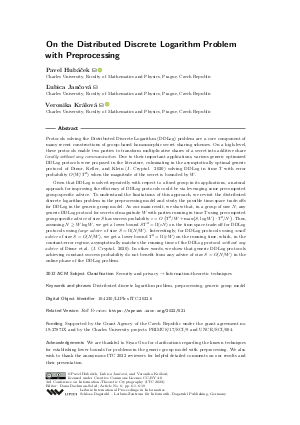@InProceedings{hubacek_et_al:LIPIcs.ITC.2022.6,
author = {Hub\'{a}\v{c}ek, Pavel and Jan\v{c}ov\'{a}, \v{L}ubica and Kr\'{a}lov\'{a}, Veronika},
title = {{On the Distributed Discrete Logarithm Problem with Preprocessing}},
booktitle = {3rd Conference on Information-Theoretic Cryptography (ITC 2022)},
pages = {6:1--6:19},
series = {Leibniz International Proceedings in Informatics (LIPIcs)},
ISBN = {978-3-95977-238-9},
ISSN = {1868-8969},
year = {2022},
volume = {230},
editor = {Dachman-Soled, Dana},
publisher = {Schloss Dagstuhl -- Leibniz-Zentrum f{\"u}r Informatik},
address = {Dagstuhl, Germany},
URL = {https://drops.dagstuhl.de/entities/document/10.4230/LIPIcs.ITC.2022.6},
URN = {urn:nbn:de:0030-drops-164847},
doi = {10.4230/LIPIcs.ITC.2022.6},
annote = {Keywords: Distributed discrete logarithm problem, preprocessing, generic group model}
}

 Creative Commons Attribution 4.0 International license
Creative Commons Attribution 4.0 International license
